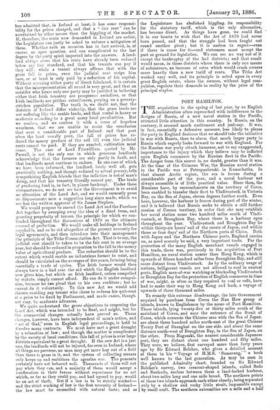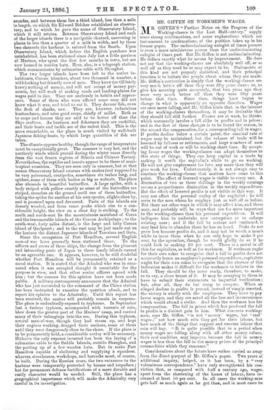PORT HAMILTON.
THE acquisition in the spring of last year, by an English Administration often reproached with indifference to the designs of Russia, of a new naval station in the Pacific, attracted little attention in this country. In Russia, on the contrary, it aroused much excitement and jealousy. It was, in fact, essentially a defensive measure, less likely to please the party in England desirous that we should take the initiative in war with Russia, than to alarm that much larger party in Russia which eagerly looks forward to war with England. For the Russian war party attach immense, not to say exaggerated, importance to the injury which they believe may be inflicted upon English commerce by the Russian fleet in the Pacific. The danger from this source is, no doubt, greater than it was. At the time of the Crimean War, the Russian naval station in the Pacific was at Petropaulovski, in Kamschatka. In that almost Arctic region, the sea is frozen during a considerable part of the year, and a naval harbour not always accessible is of little practical value. Since then, the Russians have, by encroachments on the territory of Corea, been enabled to transfer their fleet to Vladivostock, in Victoria Bay, on the Sea of Japan, eleven degrees further south. Even here, however, the harbour is frozen during part of the winter, and it is believed that Russia seeks to obtain a still further cession of Corean territory, in order that she may establish her naval station some two hundred miles south of Vladi- vostock, at Broughton Bay, where there is a harbour open throughout the year. Vladivostock and Broughton Bay lie within thirty-six hours' sail of the coasts of Japan, and within three or four days' sail of the Northern ports of China. Both with Japan and the Northern Chinese ports, England carries on, as need scarcely be said, a very important trade. For the protection of the many English merchant vessels engaged in this trade, there was, previously to the acquisition of Port
Hamilton, no naval station nearer than Hong Kong, which is upwards of fifteen hundred miles from Broughton Bay, and still more distant from Vladivostock. As by the ordinary usage of nations, belligerent vessels are not allowed to coal in neutral ports, English men-of-war watching or blockading Vladivostock or Broughton Bay for the protection of English commerce in time of war, might, as often as they required to coal or refit, have had to make their way to Hong Kong and back, a voyage of upwards of three thousand miles.
To remedy this extreme disadvantage, the late Government
acquired by purchase from Corea the Nan How group of islands, known to Englishmen by the name of Port Hamilton. These islands, lying twenty-five or thirty miles south of the mainland of Corea, and near the entrance of the Strait of Corea, which connects the Chinese seas with the Sea of Japan, are about three hundred miles north-east of the great Chinese Treaty Port of Shanghai on the one side, and about the same distance south-west of Broughton Bay, in the Sea of Japan, on the other. From Nagasaki, the nearest considerable Japanese port, they are distant about one hundred and fifty miles. They were, we believe, first surveyed more than forty years ago by Sir Edward Belcher, who gives a detailed account of them in his " Voyage of H.M.S. € Semarang,' " a book well known to the last generation. As may be seen in the published Admiralty chart, founded on Sir Edward Belcher's survey, two crescent-shaped islands, called Sodo and Sunhodo, enclose between them a land-locked harbour, about two miles long and one mile broad. The northern points of these two islands approach each other closely, being separated only by a shallow and rocky little strait, impassable except by small craft. The southern extremities are a mile and a half
asunder, and between them lies a third island, less than a mile in length, on which Sir Edward Belcher established an observa- tory, and to which he gave the name of Observatory Island, which it still retains. Between Observatory Island and each of the larger islands there is a navigable channel, narrowing in places to less than a quarter of a mile in width, and by these two channels the harbour is entered from the South. Upon Observatory Island, which before the English purchase was uninhabited, has been stationed since July last a little garrison of Marines, who spent the first few months in tents, but are now housed in wooden huts. Here, also, is a telegraph station, which communicates by submarine cable with Shanghai. The two larger islands have been left to the native in- habitants, Corean islanders, about two thousand in number, a wild-looking but friendly race of men. They know (or till lately knew) nothing of money, and will not accept of money pay- ments, but will work at making roads and landing-places for wages paid in rice. They are uncleanly in habits and appear- ance. Some of them who were offered some soap did not know what it was, and tried to eat it. They devour fish, even the flesh of sharks, raw. They are, however, industrious hnsbandmen, and raise good crops, chiefly of millet. Both as to crops and houses they are said to be better off than the Skye crofters. As boatmen and fishermen they are unskilful, and their boats and tackle are of the rudest kind. This is the more remarkable, as the place is much visited by well-built Japanese fishing-boats, by which large quantities of fish are taken.
The climate appears healthy, though the range of temperature must be exceptionally great. The summer is very hot, and the northerly winds which prevail during the winter come directly from the vast frozen regions of Siberia and Chinese Tartary. Nevertheless, the reptiles and insects appear to be those of semi- tropical countries. They are seen only in summer, but at that season Observatory Island swarms with snakes (not supposed to be very poisonous), centipedes, sometimes six inches long, and spiders, some of them with bodies as big as walnuts. The place also abounds in beautiful butterflies. A large spider, with a body striped with yellow exactly as some of the butterflies are striped, crouches on the ground until one of these butterflies, taking the spider for another of his own species, alights close by, and is pounced upon and devoured. Parts of the islands are densely wooded, and from some peaks which rise to a con- siderable height, the view on a clear day is striking. To the north and north-east lie the mountainous mainland of Corea and the innumerable islands of the Corean Archipelago ; to the south-west, forty miles distant, is the large and lofty Corean island of Quelpaert ; and to the east may be just made out on the horizon the distant Japanese islands of Tsu-sima and Goto.
Since the occupation of Port Hamilton, several English men-of-war have generally been stationed there. To the officers and crews of these ships, the change from the pleasant and interesting ports of Japan to these lonely islands cannot be an agreeable one. It appears, however, to be still doubtful whether Port Hamilton will be permanently retained as a naval station. It is stated that the Admiral who was in com- mand when it was occupied thought it unsuitable for the purpose in view, and that other senior officers agreed with him ; but the reasons for this opinion have not been made public. A military contemporary announces that the Admiral who has just succeeded to the command of the China station has been instructed to examine the question afresh, and to report his opinion to the Admiralty. Until this report has been received, the matter will probably remain in suspense. The place is undoubtedly exposed to typhoons. In September last a furious typhoon, accompanied with torrents of rain, blew down the greater part of the Marines' camp, and carried many of their belongings into the sea. During this typhoon, several men-of-war, though they had steam up, and kept their engines working, dragged their anchors, some of them until they were dangerously close to the shore. If the place is to be permanently held, a considerable outlay will be necessary. Hitherto the only expense incurred has been the laying cf a submarine cable to the Saddle Islands, outside Shanghai, and the putting up of a few wooden huts. But to make Port Hamilton capable of sheltering and supplying a squadron. wharves, storehouses, workshops, and barracks must, of course, be built. During the Russian scare, the two entrances to the harbour were temporarily protected by booms and torpedoes ; but for permanent defence fortifications of a more durable and costly character would be needed. Still, the place has a geographical importance which will make the Admiralty very careful in its investigation.



































 Previous page
Previous page